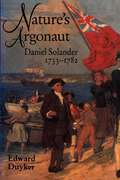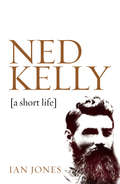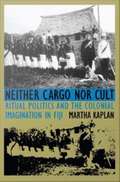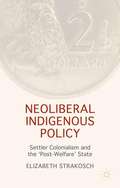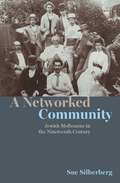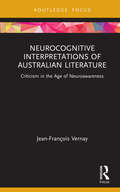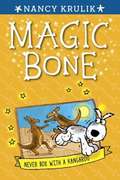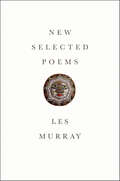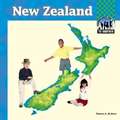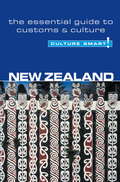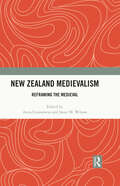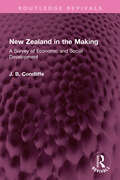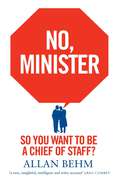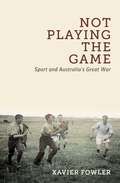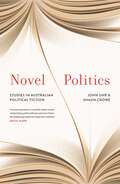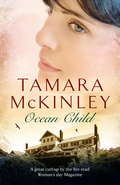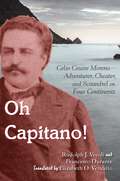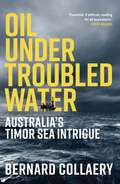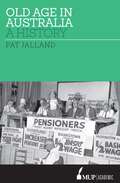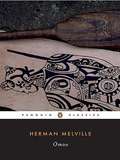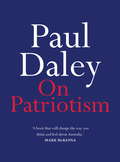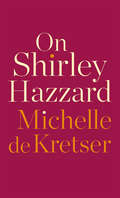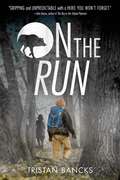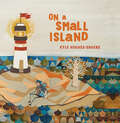- Table View
- List View
Nature's Argonaut: Daniel Solander 1733-1782
by Edward DuykerNature's Argonaut is the first full biography of this important eighteenth-century naturalist who not only circled the globe under sail but ranged as far north as the Arctic and as far south as Tierra del Fuego. Edward Duyker pays particular attention to Solander's role as a naturalist on the Endeavour during the ship's voyage along the east coast of Australia and to his pioneering contribution to the scientific study of the new continent. The author has also provided a comprehensive account of Solander's life and his contribution to the foundations of modern plant and animal taxonomy. The life of Daniel Solander, stamped with the enquiring spirit of the Enlightenment, is one of the grand adventures of the eighteenth century. Aside from the historic Endeavour voyage, Solander's Arctic travels, his involvement in industrial espionage in England on behalf of Sweden, his thwarted love for the daughter of his mentor Linnaeus and his friendships with such men as Joseph Banks, James Cook, Samuel Johnson, Matthew Boulton and Benjamin Franklin make Solander an exciting biographical subject.
Ned Kelly: A Short Life
by Ian Jones'the best Kelly biography by a country mile' - The AustralianThe definitive biography of Ned Kelly - and a superb description of his times. A bestseller since it was first published, Ned Kelly: A Short Life is acknowledged as being the definitive biography. Ian Jones combines years of research into all the records of the era and exhaustive interviews with living descendants of those involved, to present a vivid and gripping account of one of Australia's most iconic figures. `It will probably stand as the definitive account of Kelly?s life and its meaning?a work of prodigious scholarship, vivid reportage and sharp analysis?the most detailed portrait of the outlaw ever written? - Rod Moran, West Australian`the definitive biographical work? - Dr John McQuilton, author of The Kelly Outbreak
Neither Cargo Nor Cult
by Martha KaplanIn the 1880s an oracle priest, Navosavakadua, mobilized Fijians of the hinterlands against the encroachment of both Fijian chiefs and British colonizers. British officials called the movement the Tuka cult, imagining it as a contagious superstition that had to be stopped. Navosavakadua and many of his followers, deemed "dangerous and disaffected natives," were exiled. Scholars have since made Tuka the standard example of the Pacific cargo cult, describing it as a millenarian movement in which dispossessed islanders sought Western goods by magical means. In this study of colonial and postcolonial Fiji, Martha Kaplan examines the effects of narratives made real and traces a complex history that began neither as a search for cargo, nor as a cult. Engaging Fijian oral history and texts as well as colonial records, Kaplan resituates Tuka in the flow of indigenous Fijian history-making and rereads the archives for an ethnography of British colonizing power. Proposing neither unchanging indigenous culture nor the inevitable hegemony of colonial power, she describes the dialogic relationship between plural, contesting, and changing articulations of both Fijian and colonial culture. A remarkable enthnographic account of power and meaning, Neither Cargo nor Cult addresses compelling questions within anthropological theory. It will attract a wide audience among those interested in colonial and postcolonial societies, ritual and religious movements, hegemony and resistance, and the Pacific Islands.
Neoliberal Indigenous Policy: Settler Colonialism and the 'Post-Welfare' State
by Elizabeth StrakoschNeoliberal Indigenous Policy
Networked Community: Jewish Melbourne in the Nineteenth Century
by Sue SilberbergIn 1835 a renegade group of Tasmanians wishing to expand their landholdings disembarked in what was to become Melbourne. This colonising expedition was funded by a group of investors including the Jewish emancipist Joseph Solomon. Thus, in Melbourne, as in the settlement of the continent itself, Jews were at the foundation of colonisation. Unlike many other settlers, these Jews predominantly came from urban backgrounds. Although principally from London, some of them had experienced other forms of Jewish urbanism—in central and eastern Europe, the Ottoman Empire and the Caribbean—and applied their experience to the formation of a new emancipated conceptualisation of urban Judaism. In Victoria, as in the other new Australian colonies, there were no civil or political restrictions on the Jewish community. With the establishment of Melbourne, Jewish settlers were required to create new communal frameworks and the religious bodies of an active Jewish life. The community's structure and the institutions they founded were a pragmatic response to the necessities of communal formation and the realities of maintaining Judaism within this colonial outpost. As with other Jewish communities in the large centres of the world, they responded to the freedoms of an emancipated society, while the political and social environment of a new city such as Melbourne provided a unique set of opportunities. Unlike in other cities where Jewish property ownership was restricted, here Jews could live and work where they chose, becoming, from the first land sales, investors in property. Subsequently as the city expanded, as developers and builders they influenced the formation of the urban fabric, while their intellectual and economic connections brought new political and intellectual ideas and networks to the colonial experience.
Neurocognitive Interpretations of Australian Literature: Criticism in the Age of Neuroawareness (Routledge Focus on Literature)
by Jean-François VernayThis unique book on neurocognitive interpretations of Australian literature covers a wide range of analyses by discussing Australian Literary Studies, Aboriginal literary texts, women writers, ethnic writing, bestsellers, neurodivergence fiction, emerging as well as high- profile writers, literary hoaxes and controversies, book culture, and LGBTIQA+ authors, to name a few. It eclectically brings together a wide gamut of cognitive concepts and literary genres at the intersection of Australian literary studies and cognitive literary studies in the first single-author volume of its kind. It takes Australian Literary Studies into the age of neuroawareness and provides new pathways in contemporary criticism.
Never Box with a Kangaroo #11
by Nancy Krulik Sebastien BraunSparky goes down under!When Sparky chomps on his magic bone, this time it kabooms him to Kangaroo Island, Australia! There he discovers a fox terrier puppy named Mick who's lost his family. But Sparky has a plan--he'll help Mick find a new family! They ask everyone they come across: bats, penguins, kangaroos, even bees! But will anyone give Mick a home?
New Selected Poems
by Les MurrayA fresh selection of the finest poems—some previously uncollected—by one of our finest English-language poetsWhy write poetry? For the weird unemployment.For the painless headaches, that must be tapped to strikedown along your writing arm at the accumulated moment.For the adjustments after, aligning facets in a verbbefore the trance leaves you. For working always beyondyour own intelligence. —from "The Instrument"New Selected Poems contains Les Murray's own gathering from the full range of his poetry—from the 1960s through Taller When Prone (2004) and including previously uncollected work. One of the finest poets writing today, Murray reinvents himself with each new collection. Whether writing about the indignities of childhood or the depths of depression, or evoking the rhythms of the natural world; whether writing in a sharply rendered Australian vernacular or a perfectly pitched King's English, his versatility and vitality are a constant. New Selected Poems is the poet's choice of his essential works: an indispensable collection for readers who already love his poetry, and an ideal introduction for those who are new to it.
New Zealand
by Tamara L. BrittonAn introduction to the history, geography, plants and animals, government, people, and culture of New Zealand. For children.
New Zealand - Culture Smart!
by Sue ButlerCulture Smart! provides essential information on attitudes, beliefs and behavior in different countries, ensuring that you arrive at your destination aware of basic manners, common courtesies, and sensitive issues. These concise guides tell you what to expect, how to behave, and how to establish a rapport with your hosts. This inside knowledge will enable you to steer clear of embarrassing gaffes and mistakes, feel confident in unfamiliar situations, and develop trust, friendships, and successful business relationships.Culture Smart! offers illuminating insights into the culture and society of a particular country. It will help you to turn your visit-whether on business or for pleasure-into a memorable and enriching experience. Contents include* customs, values, and traditions* historical, religious, and political background* life at home* leisure, social, and cultural life* eating and drinking* do's, don'ts, and taboos* business practices* communication, spoken and unspoken"Culture Smart has come to the rescue of hapless travellers." Sunday Times Travel"... the perfect introduction to the weird, wonderful and downright odd quirks and customs of various countries." Global Travel"...full of fascinating-as well as common-sense-tips to help you avoid embarrassing faux pas." Observer"...as useful as they are entertaining." Easyjet Magazine"...offer glimpses into the psyche of a faraway world." New York Times
New Zealand Medievalism: Reframing the Medieval
by Anna Czarnowus Janet M. WilsonThis volume maps the phenomenon of medievalism in Aotearoa, initially as an import by the early white settler society, and as a form of nation building that would reinforce Britishness and ancestral belonging. This colonial narrative underpins the volume’s focus on the imperial relationship in chapters on the academic study of the Middle Ages, on medievalism in film and music, in manuscript and book collections, and colonial stained glass and architecture. Through the alternative 21st-century frameworks of a global Middle Ages and Aotearoa’s bicultural nationalism, the volume also introduces Maori understandings of the ancestral past that parallel the European epoch and, at the opposite end of the spectrum, the phenomenon of global right-wing medievalism, as evidenced in the Alt-right extremism underpinning the Christchurch mosque attack of 2019.The 11 chapters trace the transcultural moves and networks that comprise the shift from the 20th-century study of the Middle Ages as an historical period to manifestations of medievalism as the reception and interpretation of the medieval past in postmedieval times. Collectively these are viewed as indications of the changing public perception about the meaning and practice of the European heritage from the colonial to contemporary era.The volume will appeal to educationists, scholars, and students interested in the academic history of the Middle Ages in New Zealand; enthusiasts of film, music, and performance of the medieval; members of the public interested in Aotearoa’s history and popular culture; and all who enjoy the colourful reinventions of medievalism.
New Zealand in the Making: A Survey of Economic and Social Development (Routledge Revivals)
by J. B. CondliffeFirst published in 1930, New Zealand in the Making is an economic history of the democratic experiments in New Zealand. The geography, population, government ownership of public utilities, compulsory arbitration, pensions and all other factors have been covered in detail. The book will be of interest to anyone keen on learning about New Zealand as well as to students of economy, history, agriculture, and government.
No, Minister: So You Want To Be A Chief Of Staff?
by Allan BehmNothing prepares a person for the job of chief of staff to a Commonwealth Minister. There are no professional development courses, no specialist recruitment agencies and no training manuals.It was into this vortex that Allen Behm became chief of staff to Greg Combet in 2009, the minister responsible for managing carbon pricing and the pink batts crisis.A seasoned troubleshooter, Behm has an uncanny ability to anticipate and deflect political crises. By his measure success as a chief of staff is being an invisible force.'Invaluable insight from an experienced insider into the closed world of callow political advisers and their disastrous impact on the performance of many Ministers.'—TERRY MORAN
Not Playing the Game: Sport and Australia's Great War
by Xavier FowlerWar remembrance and sport have become increasingly entwined in Australia, with AFL and NRL Anzac Day fixtures attracting larger crowds than dawn services. National representative teams travel halfway around the world to visit battle sites etched in military folklore. To validate their integration into this culturally sacred occasion, promoters point to the special role of sport in the development of the Anzac legend, and with it, the birth of the nation. The air of sombre reflection that surrounds each Anzac Day is accompanied by a celebratory nationalism that sport and war supposedly embody. But what exactly is being remembered, and indeed forgotten, in these official commemorations and tributes? In Not Playing the Game, Xavier Fowler reveals that the place of sport in the Great War was highly contested. Civilian patriots and public officials complained that spectator sport distracted young men from enlisting and wasted public finances better spent elsewhere. Sport's defenders argued it was a necessary escape for a population weary of the pressures of war. These competing views often reflected differences of class, politics and ethnicity, and resulted in ferocious, sometimes violent, clashes. Not Playing the Game challenges the way our memories of the war are influenced by the fervour of sport, painting a picture not of triumph but immense turmoil and tragedy.
Novel Politics: Studies in Australian political fiction
by John Uhr Shaun CroweNovel Politics takes the relationship between literature and politics seriously, analysing the work of six writers, each the author of a classic text about Australian society. These authors bridge the history of local writing, from pre-Federation colonial Australia (Catherine Spence, Rosa Praed and Catherine Martin) to the contemporary moment (Tim Winton, Christos Tsiolkas and Kim Scott). Novel Politics unpicks the many political threads woven into these books, as they document the social world as it exists, while suggesting new possibilities for the nation's future. As political commentators of a particular kind, all six authors offer unique insights into the deeper roots of politics in Australia, beyond the theatre of parliament and out into the wider social world, as imagined by its dreamers and criticised by its most incisive discontents. Table of Contents Preface Introduction: Politics and the Study of Literature Part One Chapter 1 Catherine Spence's Clara Morison Chapter 2 Rosa Praed's Policy and Passion Chapter 3 Catherine Martin's An Australian Girl Part Two Chapter 4 Tim Winton's Dirt Music Chapter 5 Christos Tsiolkas's The Slap Chapter 6 Kim Scott's That Deadman Dance and Taboo Conclusion: Literature and the Study of Politics
Ocean Child
by Tamara McKinley1920. Having disobeyed the wishes of her aristocratic family, Lulu Pearson, a young and talented Tasmanian sculptress, finds herself alone in London in the wake of the Great War. The future is looking bright until, on the eve of her first exhibition, Lulu learns she has inherited a racing colt called Ocean Child from a mysterious benefactor, and she must return to her homeland to claim him. Baffled by the news, Lulu boards a ship to Tasmania to uncover the truth behind the strange bequest, but it seems a welcome return is more than she can hope for. Unbeknownst to Lulu, more than a few fortunes ride on Ocean Child's success - it seems everyone from her estranged mother to the stable hands has a part to play, and an interest in keeping the family secrets buried.
Ocean Child
by Tamara Mckinley1920. Having disobeyed the wishes of her aristocratic family, Lulu Pearson, a young and talented Tasmanian sculptress, finds herself alone in London in the wake of the Great War. The future is looking bright until, on the eve of her first exhibition, Lulu learns she has inherited a racing colt called Ocean Child from a mysterious benefactor, and she must return to her homeland to claim him. Baffled by the news, Lulu boards a ship to Tasmania to uncover the truth behind the strange bequest, but it seems a welcome return is more than she can hope for. Unbeknownst to Lulu, more than a few fortunes ride on Ocean Child's success - it seems everyone from her estranged mother to the stable hands has a part to play, and an interest in keeping the family secrets buried.
Oh Capitano!: Celso Cesare Moreno—Adventurer, Cheater, and Scoundrel on Four Continents
by Francesco Durante Rudolph J. VecoliThe story of Celso Cesare Moreno, one of the most famous of the emigrant Italian elites or "prominenti." Moreno traveled the world lying, scheming, and building an extensive patron/client network to to establish his reputation as a middleman and person of significance. Through his machinations, Moreno became a critical player in the expansion of western trade and imperialism in Asia, the trafficking of migrant workers and children in the Atlantic, and the conflicts of Americans and natives over the fate of Hawaii, and imperial competitions of French, British, Italian and American governments during a critically important era of imperial expansion.
Oil Under Troubled Water: Australia's Timor Sea Intrigue
by Bernard CollaeryIn May 2018 Bernard Collaery, a former Attorney-General of the Australian Capital Territory and long-term legal counsel to the government of East Timor, was charged by the Australian Commonwealth Director of Public Prosecutions with conspiracy to breach the Intelligence Services Act 2001. He was forbidden from talking about the charges against him, but under parliamentary privilege independent MP Andrew Wilkie revealed what has since been described as 'Australian politics' biggest scandal'. Five years earlier, after ASIO officers raided Collaery's home and office, Collaery told journalists that ASIS had been bugging the East Timorese government during negotiations over Timor Sea oil. He was about to represent East Timor; as well as calling the evidence of a former senior ASIS agent known publicly only as Witness K, at The Hague in a case against the Australian government. Oil Under Troubled Water relates the sordid history of Australian government dealings with East Timor, and how the actions of both major political parties have enriched Australia and its corporate allies at the expense of its tiny neighbour and wartime ally, one of the poorest nations in the world.
Old Age in Australia: A History
by Pat JallandThe Australian population is rapidly getting older, demanding important policy and service decisions. This groundbreaking book is the first to explore a 100-year history of older people in Australia from 1880 to 1980. Over that period the aged suffered as 'forgotten people' until 1945, when there was the promise of a new deal for the elderly.Major themes examined include family histories of aged care, poverty, social and medical policy, gender, the impact of wars and economic depression, housing, nursing homes and the retirement debates.Old Age in Australia provides essential historical context for current discussions about the implications of ageing in Australia.
Omoo
by Herman MelvilleMelville's continuing adventures in the South Seas-now for the first time in Penguin Classics Following the commercial and critical success of Typee, Herman Melville continued his series of South Sea adventure-romances with Omoo. Named after the Polynesian term for a rover, or someone who roams from island to island, Omoo chronicles the tumultuous events aboard a South Sea whaling vessel and is based on Melville's personal experiences as a crew member on a ship sailing the Pacific. From recruiting among the natives for sailors to handling deserters and even mutiny, Melville gives a first-person account of life as a sailor during the nineteenth century filled with colorful characters and vivid descriptions of the far-flung locales of Polynesia. .
On Patriotism
by Paul DaleyHow has militarisation come to define Australian valour? Why has the long shadow of World War I dominated our sense of patriotism?ON PATRIOTISM explores what it really means to love and serve your country. Paul Daley contemplates ways to escape the cultural binds that tie us to Anzac, British settlement and flag-waving.'Straight from the heart and deeply informed. With Indigenous culture at its centre, Paul Daley has given us a patriotism for the twenty-first century.' PROFESSOR MARK McKENNA
On Shirley Hazzard: Writers On Writers (Writers On Writers Ser.)
by Michelle De KretserOn Shirley Hazzard is a vibrant and personal tribute in which the Miles Franklin Award–winning novelist Michelle de Kretser offers a masterclass in writing and reading. She celebrates the precision and musicality of Hazzard’s prose and illuminates the humor and humanity in her work. This exhilarating book is both a brilliant introduction to Hazzard and a gift for her longtime readers.On Shirley Hazzard reveals Michelle de Kretser’s lively intelligence at work and her distinctive wit. This testament to her sustained engagement with Hazzard’s work is, at its core, an appreciation of the significance and joy of good fiction. Receptiveness when reading is a prerequisite for perceptive analysis, according to both de Kretser and Hazzard. And for prose, the “simple and precise,” the “transient and insignificant” are key qualities: “Not moonlight but the glitter of broken glass,” for de Kretser as for Chekhov. Selective biographical details about Hazzard are relayed, too—her leaving Australia and formal education at the age of sixteen, her working, unhappily, at the United Nations in Manhattan, her long friendship with Graham Greene. Hazzard’s morality is also invoked—“solidarity with the vulnerable” and pacifism being of prime importance.Shirley Hazzard (1931–2016) published her first short story in The New Yorker in 1961. The magazine continued to publish her work in the decades thereafter, including excerpts from her most successful and beloved novel, the bestseller and National Book Critics Circle Award winner, The Transit of Venus (1980). Michelle de Kretser’s insightful and provocative appreciation does Hazzard fine justice.
On The Run
by Tristan BancksBen has always wanted to be a cop, so he's intrigued when police officers show up at the door, asking for his parents. Then his parents arrive after the police leave and rush him and his sister into the car, insisting they are going on a vacation. Ben's a little skeptical—his family doesn't go on vacations. After they lose the police in a high-speed car chase and end up in a remote cabin deep in the woods, Ben discovers his parents' secret: millions of dollars were deposited into their bank account by accident, and they took the money and ran off. Ben isn't sure what to think. Are his parents criminals? And because he ran off with them, is he a criminal, too?
On a Small Island
by Kyle Hughes-OdgersA story about using creativity to beautify where you live, featuring nontraditional and street art–inspired illustrations On a small island, in a gigantic sea, lives Ari. Ari longs for the large ships to stop at his island, he longs to see remarkable things and to have interesting friends. On a small island, in a gigantic sea, Ari has an idea. A dazzling idea. An irresistible idea. A beautiful story about using your creativity to enhance the place where you live by renowned and award-winning artist, street artist, and illustrator Kyle Hughes-Odgers.
